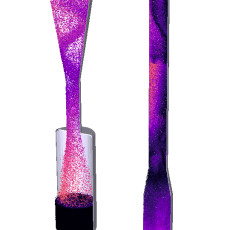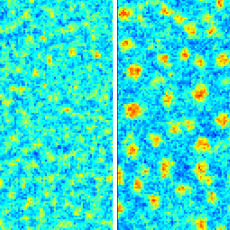Multiphysics & Multiscale Fluid Dynamics
Some of the most challenging fluid flow problems involve the interaction of multiple kinds of physics occurring over disparate lengths and time scales, such as fluids with particulate impurities, combustion of multi-species biofuels, and electrostatically charged spray painting processes.
Identifying and appropriately coupling physical models to achieve accurate, stable, and computationally tractable results is a daunting task. At Berkeley Lab, we are developing state-of-the-art mathematics and numerical methods for a variety of multi-physics multi-scale fluid flow problems. Examples include coating flow and evaporation of multi-layer paint films, multi-scale models of foam dynamics, and coupling the macroscale gas dynamics of bubble rearrangement to the microscale dynamics of the soapy liquid inside the thin films. We are developing fluctuating hydrodynamics models that capture thermal fluctuations in various fluid types, including charged fluids and fluids containing complex molecules, such as polymers or proteins.
Tackling these multi-physics problems also requires significant development of advanced computing methods and simulation on some of the world’s most powerful supercomputers. So our researchers are also developing highly-scalable algorithms targeting exascale computing and techniques such as reduced order modeling to help explore the vast parameter landscape typical of applications in manufacturing and industry.
Projects
In addition to the projects listed under the Astrophysics & Cosmology and Environmental sections, projects focusing on multiscale fluid dynamics include:
MuMSS: Multiscale Modeling and Stochastic Systems
At macroscopic scales, fluid dynamics is governed by partial differential equations that characterize the behavior of the fluid in terms of smoothly evolving fields that represent density, momentum, and other characteristics of the fluid. However, at atomic scales, fluids are discrete systems composed of individual molecules whose dynamics are governed by complex interaction potentials. The discrepancy between these two descriptions is manifest at the mesoscale. Our researchers are developing models and algorithms that can efficiently and accurately model complex fluids at the mesoscale. Contact: Daniel Ladiges (Ladiges on the Web)
Optimization of Rotary Bell Atomization
Our researchers are working with PPG Industries – one of the world’s largest paint manufacturers – to couple advanced mathematics with high-performance computing (HPC) resources to model the paint drying process and guide the development of new energy-efficient coatings systems for the automotive industry. Contact: Robert Saye (Saye on the Web)
Machine Learning Accelerated Models
Our Machine Learning Development Team is using machine learning models within an AMReX framework to accelerate the time-to-solution of computational kernels without reducing accuracy. Contact: Andy Nonaka (Nonaka on the Web)
MFiX-Exa
MFiX-Exa is a multi-phase flow simulation tool for the exascale. Contacts: Weiqun Zhang, Andrew Myers
News

New HPC4EI Project Aims to Cut Energy Costs of Painting Cars
Researchers from CRD's Mathematics Group are partnering with one of the world’s largest paint manufacturers on a new High Performance Computing for Energy Innovation project that aims to couple advanced mathematics with HPC resources to model the paint drying process and guide the development of new energy-efficient coatings systems for the automotive industry. Read More »

Exascale Application Project Targets Carbon Capture and Storage
Carbon capture and storage technologies are promising approaches for reducing CO2 emissions, but one of the biggest challenges in deploying them is the scale-up from laboratory design to industrial scale. The MFIX-Exa software subproject of the DOE’s Exascale Computing Project is helping achieve that scaling using the AMReX software framework developed at Berkeley Lab. Read More »

Harnessing the Power of Exascale for Wind Turbine Simulations
ExaWind, a DOE Exascale Computing Project, is developing new simulation capabilities to more accurately predict the complex flow physics of wind farms, and Berkeley Lab is bringing its adaptive mesh refinement expertise to the project to help make this happen. Read More »

Between Micro and Macro, Berkeley Lab Mathematicians Model Fluids at the Mesoscale
The math whizzes at the Center for Computational Sciences and Engineering (CCSE) at Lawrence Berkeley National Laboratory (Berkeley Lab) are at the forefront of a neglected corner of the scientific world: building mathematical models for fluids at the mesoscale. Read More »

Industry, Berkeley Lab Partner to Build Energy Efficiency into Paint Design
Through DOE's HPC4Mfg program, PPG - one of the world's largest paint manufacturers - is collaborating with applied mathematicians in the Computational Research Division on computational models that will help optimize paint design and application to reduce energy consumption. Read More »







 Instagram
Instagram YouTube
YouTube